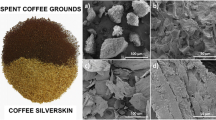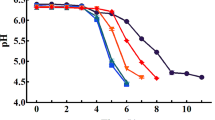Abstract
This work aims to assess the physicochemical characteristics and final sensory quality of Yellow Catuai IAC 62 Arabica coffee fermented with Saccharomyces cerevisiae. For such a purpose, a Composite Central Rotational Design (CCRD) was performed to investigate how fermentation time,temperature and pH conditions, moisture content and concentration of sugars and organic acids affect its sensory quality on two different roast levels in accordance with Specialty Coffee Association (SCA) protocols. It was found that fructose concentration decreased from 12 g/L to around 5 g/L during fermentation, regardless of temperature condition. Furthermore, longer fermentation times and higher temperatures have lowered sucrose and glucose concentrations from 4 to 2 g/L and 7 g/L to zero, respectively. Glycerol concentration was higher as time and temperature increased, and optimal conditions ranged at temperatures between 24 °C and 32 °C from 35 to 45 h of fermentation time. pH decreased as fermentation time elapsed, but there was a more significant reduction due to higher temperatures, starting at around pH 5 and, lower than 4 under extreme conditions. Contents of organic acids such as acetic, propionic, succinic, and lactic acids, were measured at the final stage of each fermentation process under studied conditions. It was observed that coffee samples achieved final scores ranging from 81 to 85 (SCA score), even in longer times and extreme temperature conditions, thus all samples have been classified as specialty coffees. This work described the initial step towards parameterizing fermentation processes, given that the response variables of temperature and fermentation time, were optimal and enhanced the sensory quality of coffee as beverage. Saccharomyces cerevisiae, a commercial product which has already been made available for producers, can ensure an increase in the sensory quality of coffee.



Similar content being viewed by others
Data availability
Not applicable for that section.
References
Association SC, World Coffee Research (2016) Coffee Taster’s Flavors Wheel. http://store.sca.coffee/collections/tools/products/the-coffee-tasters-flavor-wheel-portuguese-digital-version?variant=17543331206
Avallone S, Guyot B, Brillouet J-M et al (2001) Microbiological and biochemical study of coffee fermentation. Curr Microbiol 42:252–256. https://doi.org/10.1007/s002840110213
Brando CHJ, Brando MFP (2014) Methods of coffee fermentation and drying. In: Graham H (ed) Schwan RE, Fleet. Cocoa and Coffee Fermentation. CRC Taylor & Francis, Boca Raton, pp 367–398
Brasil (2003) Regulamento Técnico de Identidade e de Qualidade para a Classificação do Café Beneficiado Grão Cru
Brasil, Ministério da Agricultura PeA (2009) Regras para Análise de Sementes. Brasília, Brasil
Bressani APP, Martinez SJ, Evangelista SR et al (2018) Characteristics of fermented coffee inoculated with yeast starter cultures using different inoculation methods. LWT 92:212–219. https://doi.org/10.1016/j.lwt.2018.02.029
De Bruyn F, Zhang SJ, Pothakos V et al (2017) Exploring the impacts of postharvest processing on the microbiota and metabolite profiles during green coffee bean production. Appl Environ Microbiol. https://doi.org/10.1128/AEM.02398-16
de Neto DPC, de Melo PGV, Finco AMO et al (2018) Efficient coffee beans mucilage layer removal using lactic acid fermentation in a stirred-tank bioreactor: Kinetic, metabolic and sensorial studies. Food Biosci 26:80–87. https://doi.org/10.1016/j.fbio.2018.10.005
de Pereira GV, M, Neto E, Soccol VT, et al (2015) Conducting starter culture-controlled fermentations of coffee beans during on-farm wet processing: growth, metabolic analyses and sensorial effects. Food Res Int 75:348–356. https://doi.org/10.1016/j.foodres.2015.06.027
Elhalis H, Cox J, Frank D, Zhao J (2020a) The crucial role of yeasts in the wet fermentation of coffee beans and quality. Int J Food Microbiol 333:108796. https://doi.org/10.1016/j.ijfoodmicro.2020.108796
Elhalis H, Cox J, Zhao J (2020b) Ecological diversity, evolution and metabolism of microbial communities in the wet fermentation of Australian coffee beans. Int J Food Microbiol 321:108544. https://doi.org/10.1016/j.ijfoodmicro.2020.108544
Evangelista SR, Silva CF, da Miguel MGPC et al (2014b) Improvement of coffee beverage quality by using selected yeasts strains during the fermentation in dry process. Food Res Int 61:183–195. https://doi.org/10.1016/j.foodres.2013.11.033
Evangelista SR, da Miguel MGCP, Silva CF et al (2015) Microbiological diversity associated with the spontaneous wet method of coffee fermentation. Int J Food Microbiol 210:102–112. https://doi.org/10.1016/j.ijfoodmicro.2015.06.008
FAOSTAT (2019) Food and Agriculture Organization of the United Nation. FAOSTAT
Haile M, Kang W (2019a) Antioxidant activity, total polyphenol, flavonoid and tannin contents of fermented green coffee beans with selected yeasts. Fermentation 5:29. https://doi.org/10.3390/fermentation5010029
Haile M, Kang WH (2019b) The role of microbes in coffee fermentation and their impact on coffee quality. J Food Qual 2019:1–6. https://doi.org/10.1155/2019/4836709
I. C. O. ICO (2022) No title. In: Trade statistics. https://www.ico.org/
Illy A, Viani R (2005) Espresso coffee: the chemistry of quality, 2nd edn. Elsevier-Academic Press Limited
Isquierdo EP, Borém FM, de Andrade ET et al (2013) Drying kinetics and quality of natural coffee. Trans ASABE. https://doi.org/10.13031/trans.56.9794
Knopp S, Bytof G, Selmar D (2006) Influence of processing on the content of sugars in green Arabica coffee beans. Eur Food Res Technol 223:195–201. https://doi.org/10.1007/s00217-005-0172-1
Kwak HS, Jeong Y, Kim M (2018) Effect of yeast fermentation of green coffee beans on antioxidant activity and consumer acceptability. J Food Qual 2018:1–8. https://doi.org/10.1155/2018/5967130
Lee LW, Cheong MW, Curran P et al (2015) Coffee fermentation and flavor: an intricate and delicate relationship. Food Chem 185:182–191. https://doi.org/10.1016/j.foodchem.2015.03.124
Lee LW, Cheong MW, Curran P et al (2016) Modulation of coffee aroma via the fermentation of green coffee beans with Rhizopus oligosporus: II. Effects of different roast levels. Food Chem 211:925–936. https://doi.org/10.1016/j.foodchem.2016.05.073
Martinez SJ, Bressani APP, da Miguel MG, CP, et al (2017a) Different inoculation methods for semi-dry processed coffee using yeasts as starter cultures. Food Res Int 102:333–340. https://doi.org/10.1016/j.foodres.2017.09.096
Masoud W, Jespersen L (2006) Pectin degrading enzymes in yeasts involved in fermentation of Coffea arabica in East Africa. Int J Food Microbiol 110:291–296. https://doi.org/10.1016/j.ijfoodmicro.2006.04.030
Pimenta CJ (2003) Qualidade do café. Editora UFLA, Lavra
Pimenta CJ, Angélico CL, Chalfoun SM (2018) Challengs in coffee quality: Cultural, chemical and microbiological aspects. Ciência e Agrotecnologia 42:337–349. https://doi.org/10.1590/1413-70542018424000118
Ribeiro BB, Mendonça LL, Dias RAA et al (2011) Parâmetros qualitativos do Café Provenientes de diferentes processamentos na Pós-Colheita. Agrarian 4:273–279
Ribeiro LS, da Miguel MGCP, Evangelista SR et al (2017) Behavior of yeast inoculated during semi-dry coffee fermentation and the effect on chemical and sensorial properties of the final beverage. Food Res Int 92:26–32. https://doi.org/10.1016/j.foodres.2016.12.011
Santos da Silveira J, Durand N, Lacour S et al (2019) Solid-state fermentation as a sustainable method for coffee pulp treatment and production of an extract rich in chlorogenic acids. Food Bioprod Process 115:175–184. https://doi.org/10.1016/j.fbp.2019.04.001
Silva CF (2014) Microbial activity during coffee fermentation. In: Schwan RE, Fleet GH (eds) Cocoa and coffee fermentation. CRC Taylor & Francis, Boca Raton, pp 398–423
Specialty Coffee Association of America (2015) Cupping specialty coffees. https://www.scaaa.org/PDF/resources/cupping-protocols.pdf
Specialty Coffee Association of America (2020) protocols and best practices. https://sca.coffee/research/protocols-best-practices
Swiegers JH, Bartowsky EJ, Henschke PA, Pretorius IS (2005) Yeast and bacterial modulation of wine aroma and flavour. Aust J Grape Wine Res 11:139–173. https://doi.org/10.1111/j.1755-0238.2005.tb00285.x
Tang VCY, Sun J, Cornuz M et al (2021) Effect of solid-state fungal fermentation on the non-volatiles content and volatiles composition of Coffea canephora (Robusta) coffee beans. Food Chem 337:128023. https://doi.org/10.1016/j.foodchem.2020.128023
Velmourougane K (2013) Impact of Natural Fermentation on Physicochemical, Microbiological and Cup Quality Characteristics of Arabica and Robusta Coffee. Proc Natl Acad Sci India Sect B Biol Sci 83:233–239. https://doi.org/10.1007/s40011-012-0130-1
Wang C, Sun J, Lassabliere B et al (2020) Coffee flavour modification through controlled fermentations of green coffee beans by Saccharomyces cerevisiae and Pichia kluyveri: Part I. Effects from individual yeasts. Food Res Int 136:1088. https://doi.org/10.1016/j.foodres.2020.109588
Acknowledgements
The authors would like to thank the Coordenação de Aperfeiçoamento de Pessoal de Nível Superior—Brasil (CAPES)—Finance Code 001, Conselho Nacional de Desenvolvimento Cientítico e Tecnológico (CNPq) and Fundação de Amparo à Pesquisa de Minas Gerais (FAPEMIG). The authors are also grateful to the managers of the Farroupilha Group—Patos de Minas/MG, who kindly ceded the coffee laboratory for conducting sensory analysis sessions for this study, and the managers of the Veloso Coffee laboratory—Carmo do Paranaíba/MG, who kindly gave up the space to conduct sensory analysis sessions. Moreover, Lallemand Brazil, gently supplies yeast. Study with University-Industry-Farms integration.
Funding
This research did not receive any specific grant from funding agencies in the public, commercial, or not-for-profit sectors.
Author information
Authors and Affiliations
Contributions
C.J.T.V.: Writing, Research, Methodology. L.S.M.: Writing, Review, Editing. R.C.S.: Validation, Software. M.A.S.: Formal analysis, Supervision, Validation, Review, Editing. M.F.Z.: Formal analysis, Supervision, Validation, Review, Editing. C.Z.G.: Formal analysis, Supervision, Validation, Review, Editing, Software. All authors reviewed the manuscript.
Corresponding author
Ethics declarations
Conflict of interest
Carlos Johnantan Tolentino Vaz declares that he has no conflict of interest. Larissa Soares de Menezes declares that she has no conflict of interest. Ricardo Corrêa de Santana declares that he has no conflict of interest, Michelle Andriati Sentanin declares that she has no conflict of interest. Marta Fernanda Zotarelli declares that she has no conflict of interest and Carla Zanella Guidini declares that she has no conflict of interest.
Ethical standards
The present work is consonance with the ethical regulations of the institution and the country, having been approved by the Ethics Committee in Research with Human Beings under No. CAAE 55909622.0.0000.5152.
Rights and permissions
Springer Nature or its licensor (e.g. a society or other partner) holds exclusive rights to this article under a publishing agreement with the author(s) or other rightsholder(s); author self-archiving of the accepted manuscript version of this article is solely governed by the terms of such publishing agreement and applicable law.
About this article
Cite this article
Vaz, C.J.T., de Menezes, L.S., de Santana, R.C. et al. Effect of fermentation on the physicochemical characteristics and sensory quality of Arabica coffee. 3 Biotech 13, 403 (2023). https://doi.org/10.1007/s13205-023-03768-9
Received:
Accepted:
Published:
DOI: https://doi.org/10.1007/s13205-023-03768-9




